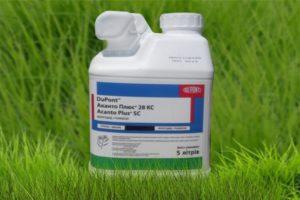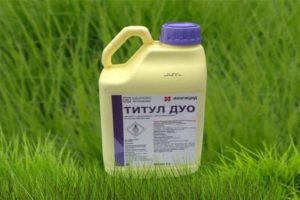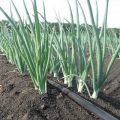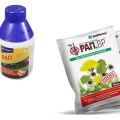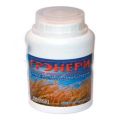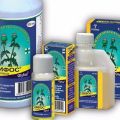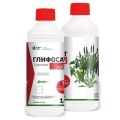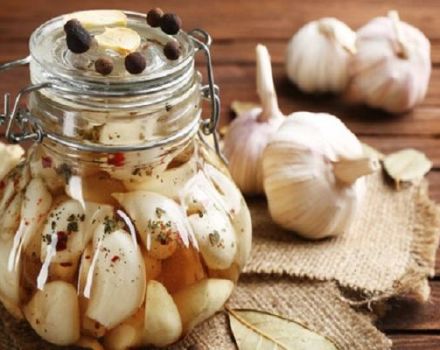Instructions for the use of a continuous action herbicide Roundup against weeds and how to breed correctly
Roundup herbicide is used for weeds. This chemical is used only once - before the emergence of garden plants. The herbicide is on sale in bottles. The liquid is diluted with water, weeds are irrigated with the prepared solution. Spraying is carried out in dry weather, after rain, since clean leaves absorb active substances better. A single treatment protects the garden from weeds for 1-2 months.
Content
- 1 Composition, release form and purpose of the drug Roundup
- 2 How does the remedy work?
- 3 Advantages and disadvantages of the drug
- 4 Consumption rate for different plants
- 5 How to properly prepare a working solution
- 6 How to use the product?
- 7 Precautions for use
- 8 Toxicity degree
- 9 Compatibility with other products
- 10 Storage rules and periods
- 11 Where to buy and how much does the drug cost?
- 12 Herbicide analogs
Composition, release form and purpose of the drug Roundup
A continuous herbicide Roundup can be used to control weeds. It is a liquid that is sold in 50-1000 ml plastic bottles. Manufacturer - the company "August".
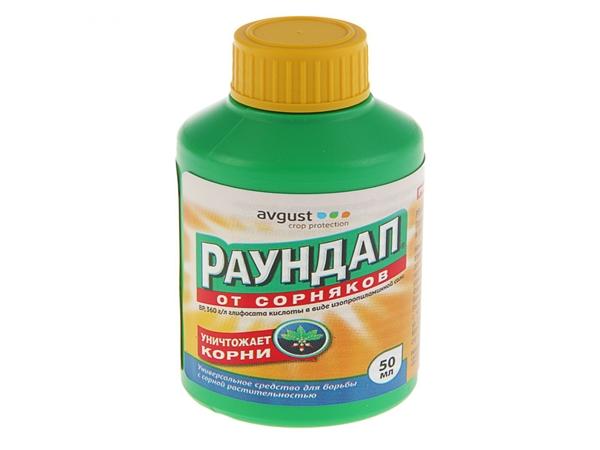
The herbicide acts on weeds due to the active substance in its composition - glyphosate. The drug destroys annual, perennial, cereal and dicotyledonous weeds. Helps to protect vineyards, fruit and citrus crops.
Roundup is diluted with water at the dosage indicated in the instructions for use of this chemical. The working solution is sprayed with weeds until the emergence of plants.
How does the remedy work?
The herbicide is taken in the dose specified in the instructions for the preparation and dissolved in water. Weeds are sprayed with the solution. The active substance enters the plant through the stomata and pores. The drug inhibits the processes of photosynthesis and respiration of weeds. A week after treatment, the plants turn yellow and dry out.
The active substances enter the weeds through the leaves, after spraying with a herbicide solution.
In the soil, the chemical disintegrates quickly and does not affect seed germination.

Advantages and disadvantages of the drug
The herbicide has several advantages:
- quickly penetrates into weeds and causes their death;
- after processing, the garden is protected from weeds for 1-2 months;
- not toxic to humans;
- saves from 300 types of weeds;
- reduces the amount of mechanical tillage;
- destroys leaves and roots of weeds;
- increases the germination of cultivated plants;
- does not accumulate in the soil.
Disadvantages of the drug:
- if used incorrectly, it can lead to the death of cultivated plants growing in the vicinity;
- airborne can poison bees.

Consumption rate for different plants
The herbicide is dissolved in water in the following proportions:
- Against perennial weeds: 10 milliliters per liter of water.
- Against annual weeds: 6 milliliters per liter of liquid.
- Against annual dicotyledons: 8 milliliters per liter of water.
- Against trees: 10 milliliters per liter of liquid.
- Against aquatic plants: 6 milliliters per liter of water.
Weeds are sprayed with poison before emergence of cultivated plants. A plot of 100 square meters requires 5 liters of solution. It is advisable to buy the herbicide in a small jar and use it immediately.
Irrigation of 100 square meters requires 5 liters of water and 50 milliliters of herbicide.
How to properly prepare a working solution
Roundup should be diluted with clean water at room temperature. The solution is prepared in a plastic bucket or canister. First, the required amount of water is measured, then the herbicide is poured out and the liquids are thoroughly mixed. The working solution is prepared immediately before use.

How to use the product?
According to the instructions for use, weeds are irrigated with a solution prepared from water and a herbicide until the emergence of plants. Roundup can be used before and 3-5 days after sowing garden crops. The main thing is that the chemical agent only gets on the ground part of the weeds.
Vegetation processing is carried out after rain, in dry and calm weather. Half a liter of the solution is sprayed over an area of 10 square meters. The treatment is carried out in the immediate vicinity of the weeds. The solution is sprayed around the garden with a spray bottle. Unused residues are poured out of the field.
Precautions for use
Spraying plants should be carried out in a protective suit, rubber gloves, glasses and a mask. It is forbidden to use food utensils to prepare the solution. Do not drink or inhale herbicide vapors. After working in the garden, you need to take off your protective suit and wash your face and hands with soap and water. If liquid gets into eyes, wash them with running water. In case of herbicide poisoning, it is recommended to rinse the stomach with a solution of soda or salt and induce vomiting.
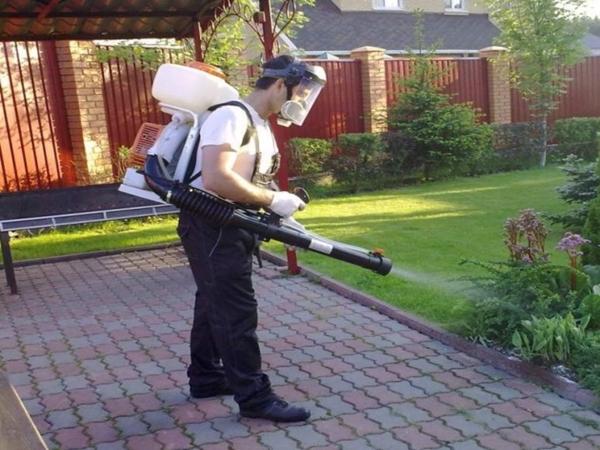
Toxicity degree
Roundup is classified as a hazard class 3 chemical. The drug does not cause any harm to humans. However, in high concentration, contact with eyes may cause stinging and swelling. If you accidentally drink it, then all the signs of poisoning (nausea, headache) will appear, as well as an allergic reaction.
The herbicide solution is dangerous for bees, can lead to their death. Once on the ground, this chemical inhibits the vital functions of insects and worms.
Compatibility with other products
Roundup can be used with other herbicides to control weeds. Using different herbicides together helps to get rid of almost all weeds growing in the garden. True, the dosage of drugs needs to be slightly reduced.

Storage rules and periods
Roundup is stored in a plastic factory bottle in a dry place at room temperature. The shelf life of this drug is 5 years. Liquid should not be stored at temperatures below -5 and above +35 degrees Celsius. The rest of the working solution is immediately poured out of the garden.
Where to buy and how much does the drug cost?
Roundup can be purchased at any outlet that sells plant seeds, fertilizers, and insect and disease control products. The herbicide is sold at market stalls offering rodent and weed control products. The cost of a 50 ml bottle depends on the seller's margin and ranges from $ 1 to $ 3 (equivalent).
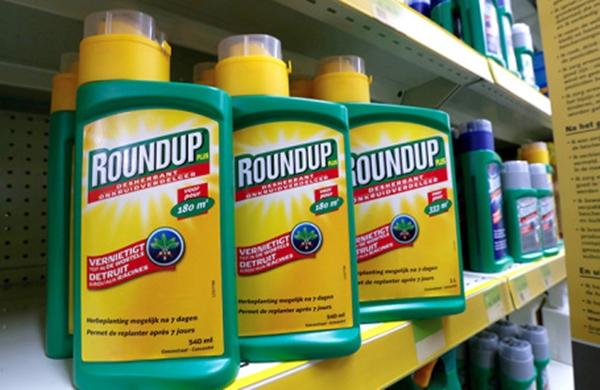
Herbicide analogs
Similar herbicides can be used instead of Roundup.These chemicals have a similar composition and principle of action. The active substances of herbicidal preparations penetrate into the weeds and lead to their death. Roundup analogues: Otaman, Total, Tornado 500, Glyfovit Extra.
